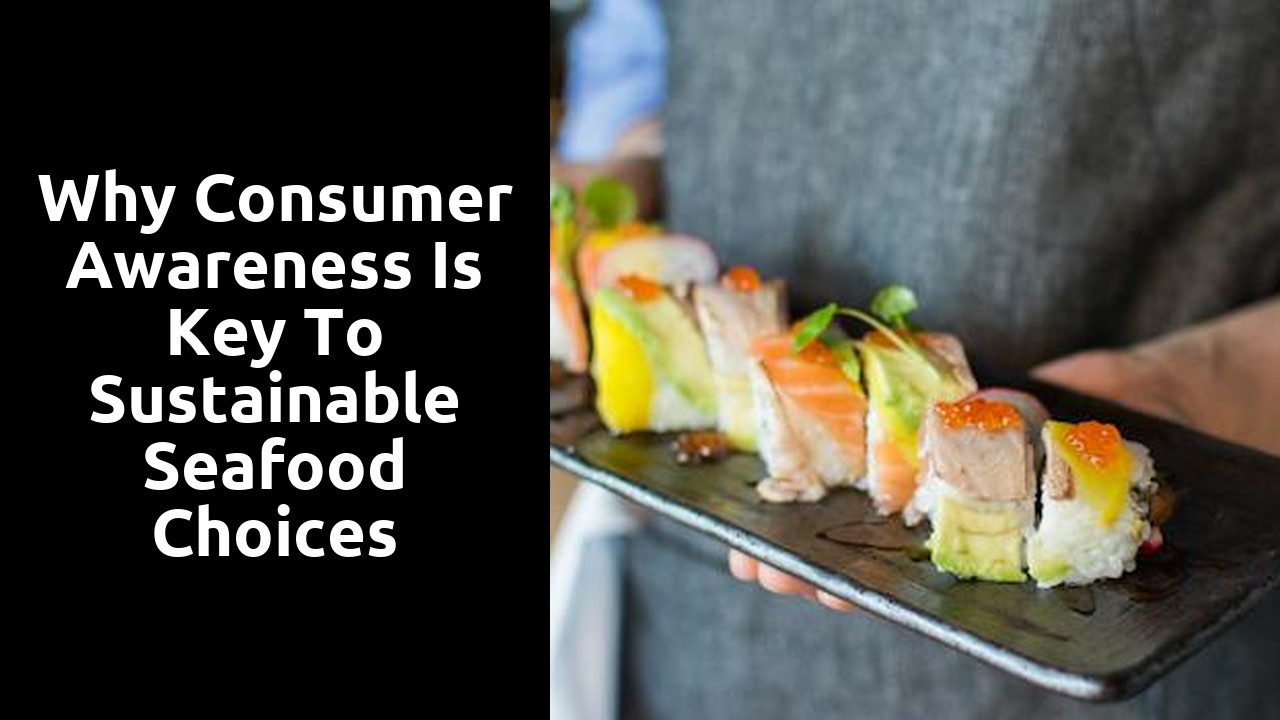Why Consumer Awareness is Key to Sustainable Seafood Choices

Common Misconceptions About Sustainable Seafood
Many consumers often hold misconceptions about what sustainable seafood truly means. One common belief is that all seafood labeled as "sustainable" is automatically environmentally friendly and sourced ethically. However, this is not always the case. The term "sustainable" can sometimes be loosely used by companies to greenwash their products, giving the impression of environmental responsibility without meeting stringent sustainability criteria.
Another prevalent misconception is that eating lower down the food chain, such as consuming only small fish like sardines and anchovies, is the best way to support sustainable seafood practices. While it is true that smaller fish tend to have shorter life spans, reproduce quicker, and are less likely to be overfished, this does not mean that larger species should be completely eliminated from one's diet. In fact, diverse seafood consumption can help maintain the balance of marine ecosystems, provided that these larger species are sourced sustainably.
Debunking the Myth of "Sustainable" Labeling
Consumers often rely on labels such as "sustainable" or "eco-friendly" when making seafood choices, assuming that these terms guarantee ethical and environmentally responsible production practices. However, these labels can be misleading and vague, leading to misconceptions about the true sustainability of the seafood being purchased. The term "sustainable" can be used in various ways, and without clear regulations and standards in place, it is challenging for consumers to discern the validity of such claims.
Companies may use the label "sustainable" without adhering to robust sustainability practices or independent certification standards. This practice, known as "greenwashing," allows businesses to capitalise on the growing demand for sustainable products without making substantial changes to their operations. It is imperative for consumers to look beyond marketing claims and delve deeper into the supply chain and sourcing practices of seafood products to ensure they are making informed and truly sustainable choices.
Educating the Next Generation About Responsible Seafood Consumption
One pivotal aspect in fostering sustainable seafood practices lies in educating the younger generation on the importance of responsible consumption. Incorporating marine conservation programs into school curriculums can greatly influence how children perceive their relationship with the oceans and the seafood industry. By instilling values of sustainability and ethical choices from an early age, future consumers are more likely to actively seek out information regarding where their seafood comes from and how it is sourced.
With the rise of global environmental concerns, there is a pressing need to equip young individuals with the knowledge and tools to make informed decisions about seafood consumption. Through interactive activities, workshops, and field trips focusing on marine ecosystems and fishing methods, schools can play a critical role in shaping the minds of the next generation to become conscientious consumers. By nurturing an understanding of the delicate balance between human needs and environmental preservation, we can empower children to be advocates for sustainable seafood practices in the years to come.
Implementing Marine Conservation Programs in Schools
Marine conservation programs play a crucial role in raising awareness amongst the younger generation about the importance of sustainable seafood choices. By integrating these programs into school curriculums, students can develop a deeper understanding of the impact of their consumption habits on marine ecosystems. Teaching students about the significance of preserving marine life not only fosters a sense of environmental responsibility but also empowers them to make informed decisions when it comes to selecting seafood products.
Incorporating marine conservation initiatives into educational settings provides a platform for students to engage with real-world issues surrounding overfishing, habitat destruction, and species depletion. By immersing students in practical experiences such as beach clean-ups, educational field trips, and interactive workshops, schools can instill a sense of stewardship towards oceans and marine life. Through these hands-on activities, students can witness firsthand the detrimental effects of unsustainable fishing practices and the critical need to protect our marine resources for future generations.
The Economic Benefits of Supporting Sustainable Seafood Fisheries
Supporting sustainable seafood fisheries not only safeguards marine ecosystems but also brings about significant economic advantages. By choosing responsibly sourced seafood, consumers help create a demand for products that are harvested using methods that preserve the health of our oceans. This demand drives the need for more sustainable fishing practices, ultimately leading to the protection and regeneration of fish populations for future generations.
Moreover, investing in sustainable seafood fisheries can contribute to the economic growth of coastal communities. Small-scale fishers who adhere to sustainable practices often benefit from increased market access and higher prices for their products. This not only enhances their livelihoods but also strengthens the local economy, creating a ripple effect that supports jobs and businesses in the region.
Enhancing the Livelihoods of SmallScale Fishers in Coastal Communities
Small-scale fishers in coastal communities play a crucial role in the sustainable seafood industry. By supporting these local fishers, we can help enhance their livelihoods and ensure the continued availability of responsibly sourced seafood. Through initiatives that provide fair wages, access to markets, and training in sustainable fishing practices, we can empower these fishers to protect marine ecosystems while supporting their families.
In many coastal regions, small-scale fishers face challenges such as overfishing, environmental degradation, and fluctuating market prices. By investing in programmes that support these fishers, we can help create a more stable and sustainable seafood industry. This not only benefits the fishers themselves but also contributes to the preservation of marine biodiversity and the long-term health of our oceans.
Related Links
What Makes Wild Salmon SustainableTop 10 Sustainable Seafood Choices for Consumers
The History of Overfishing and Depletion of Wild Salmon Stocks
Review: The Environmental Impact of Aquaculture Practices
What to Look for in Sustainable Seafood Certifications
Why Overfishing is a Threat to Wild Salmon Stocks